In the case of online advertising, PPC (Pay-Per-Click) is widely considered to be one of the most measurable and ROI-focused methods.
But here’s the twist: even great campaigns can fail if your budget isn’t spent intelligently.
You can’t simply spend money with Google Ads or Amazon and expect a miracle.
You need a plan—a real, realistic strategy for PPC budgeting that fits your goals, audience, and plans for business growth.
In this detailed, no-junk guide, we’ll take you through the ins and outs of PPC budgeting.
From learning what budget allocation is to deciding how much to spend, controlling costs, and staying in pace with the competition, we’ve got it covered.
So grab your favorite cup of coffee, and let’s get started!
What Is Budget Allocation in PPC?

Let’s begin by asking what budget allocation is.
In simple terms, budget allocation is the way you choose to split your marketing budget among various PPC campaigns, channels, keywords, audiences, or phases in the funnel.
It is the solution to the following question: Where will my money be best spent?
Your budget is critical in PPC, where each click incurs a cost.
If you overcommit to poorly performing campaigns or undercommit to high-potential ones, you’re simply throwing your marketing money away.
Clever advertising budget allocation ensures you’re getting the most from each dollar.
Why PPC Budget Allocation Isn’t Optional
Let’s be real—the price of PPC has gone up in virtually every niche.
And if you’re going after high-cost keywords quickly, it can add up. That’s why a budget strategy that’s thought out is not an option.
Without one, you might:
- Spend your entire pay-per-click budget within a week.
- Spent opportunities because you spent all your daily budgets.
- Not scale successful campaigns.
Whether you’re spending $500 or $50,000, proper PPC budget management ensures you’re spending wisely and not just throwing money into the digital void.
This is especially true if you’re offering white label PPC services, where managing client budgets efficiently reflects directly on your agency’s performance and profitability.
Breaking Down the Key Components of a PPC Budget
Here’s what your PPC budget will typically include:
1. Campaign Budget

This is your total budget for an entire campaign. Think of it as the big picture. You’ll want to allocate the budget based on goals, such as leads, sales, or brand awareness.
2. Ad Group and Keyword Budgets
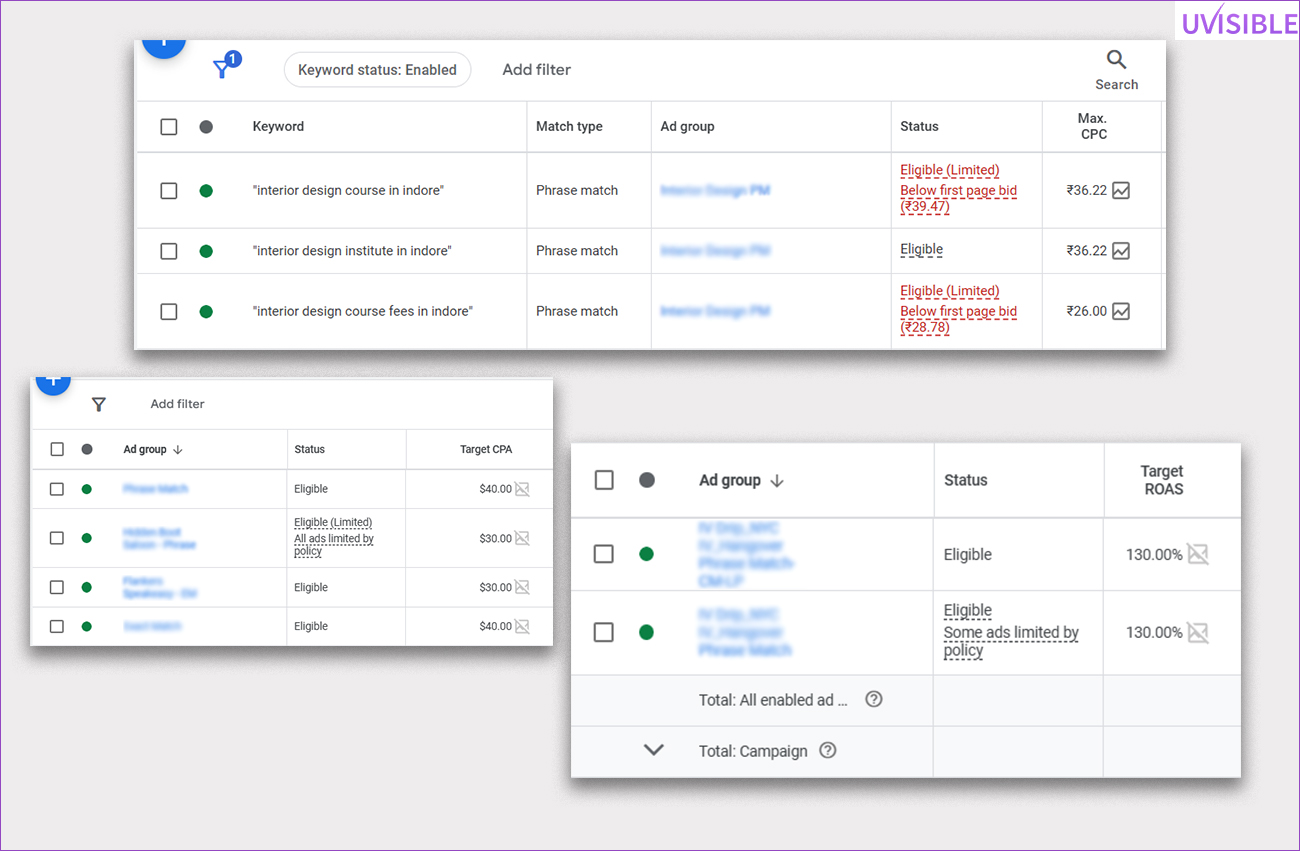
Google Ads doesn’t allow direct budget allocation at the ad group or keyword level.
However, selecting the right bidding strategy, like manual CPC or target CPA, can help you gain more control over how your budget is distributed across ad groups and keywords.
For PPC for plumbers, targeting high-intent service-specific keywords like “emergency plumber near me” can be particularly cost-effective.
3. Platform Spend (SEM Spend)

Do you have ads running on Google, Amazon, Bing, Meta, or LinkedIn? Your SEM spend will vary depending on the platform, so allocate your budget accordingly.
4. Bidding Strategy

Your selected bidding strategy (manual CPC, increased CPC, target ROAS, etc.) may significantly influence your overall PPC advertising expense.
Bidding higher = more rapid spend.
5. Tools and Management
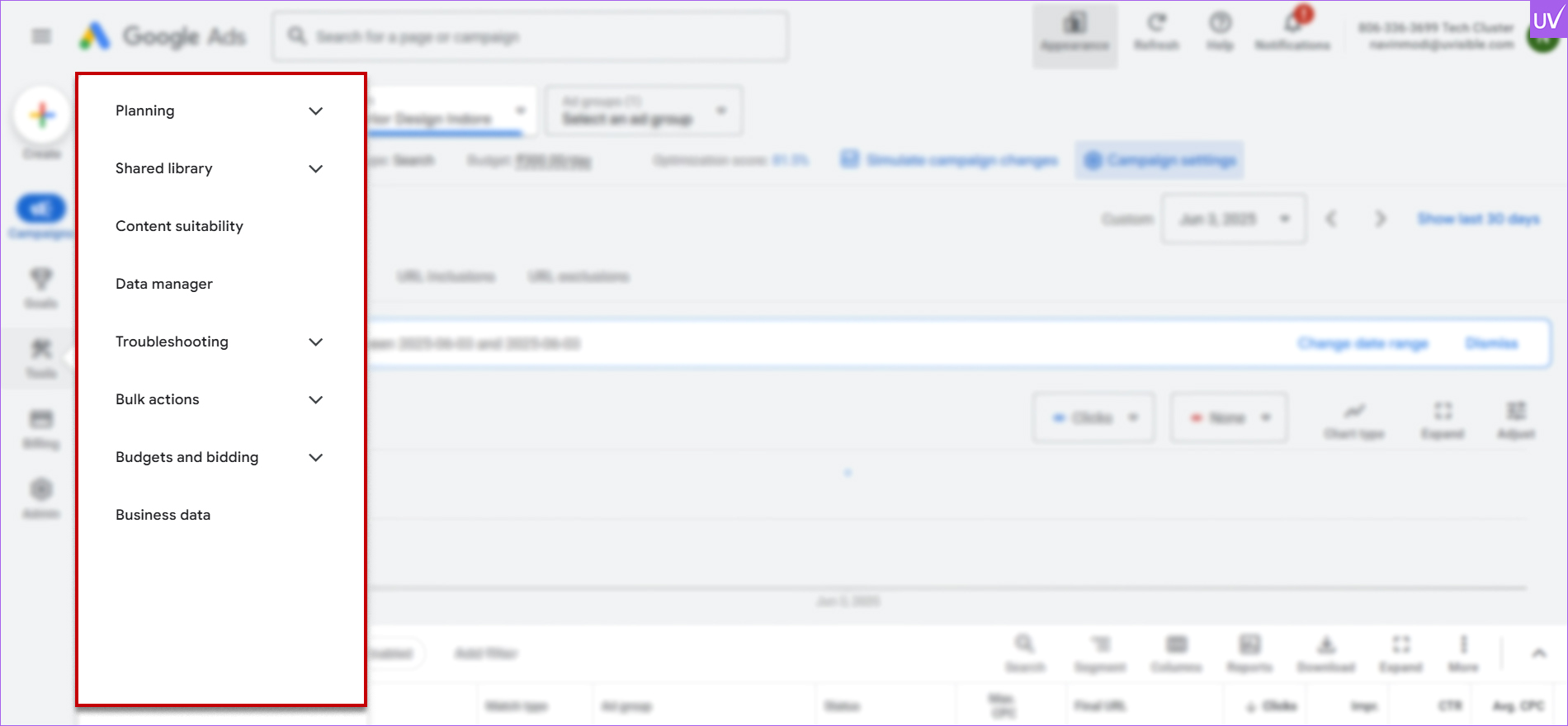
Don’t forget to account for PPC tools and services such as budget management software or agency fees. These are all part of your overall PPC marketing expense.
How to Calculate PPC Budget Step-by-Step
Let’s make this easy:

Step 1: Fix your revenue goal.
For example, you want to generate $10,000 in sales.
Step 2: Understand your conversion rate.
If your website converts at 5%, you need 200 leads to reach that goal.
Step 3: Find your average CPC.
Let’s assume it’s $2.50 per click.
To get 200 leads at 5% conversion, you need 4,000 clicks.
Multiply that by your CPC: 4,000 x $2.50 = $10,000 PPC budget.
See? That’s how you calculate PPC budget with actual numbers. You can utilize tools like a PPC budget calculator to simplify this math, but knowing the basics is good.
Campaign Budgeting for Small Businesses
If you’re a small business owner, every dollar counts. Here’s how to make a limited budget go further:
- Start small: Start with a test budget and gradually increase. Don’t blow your entire ad budget on day one.
- Focus on long-tail keywords: These are lower in competition, yet can bring in high-intent traffic.
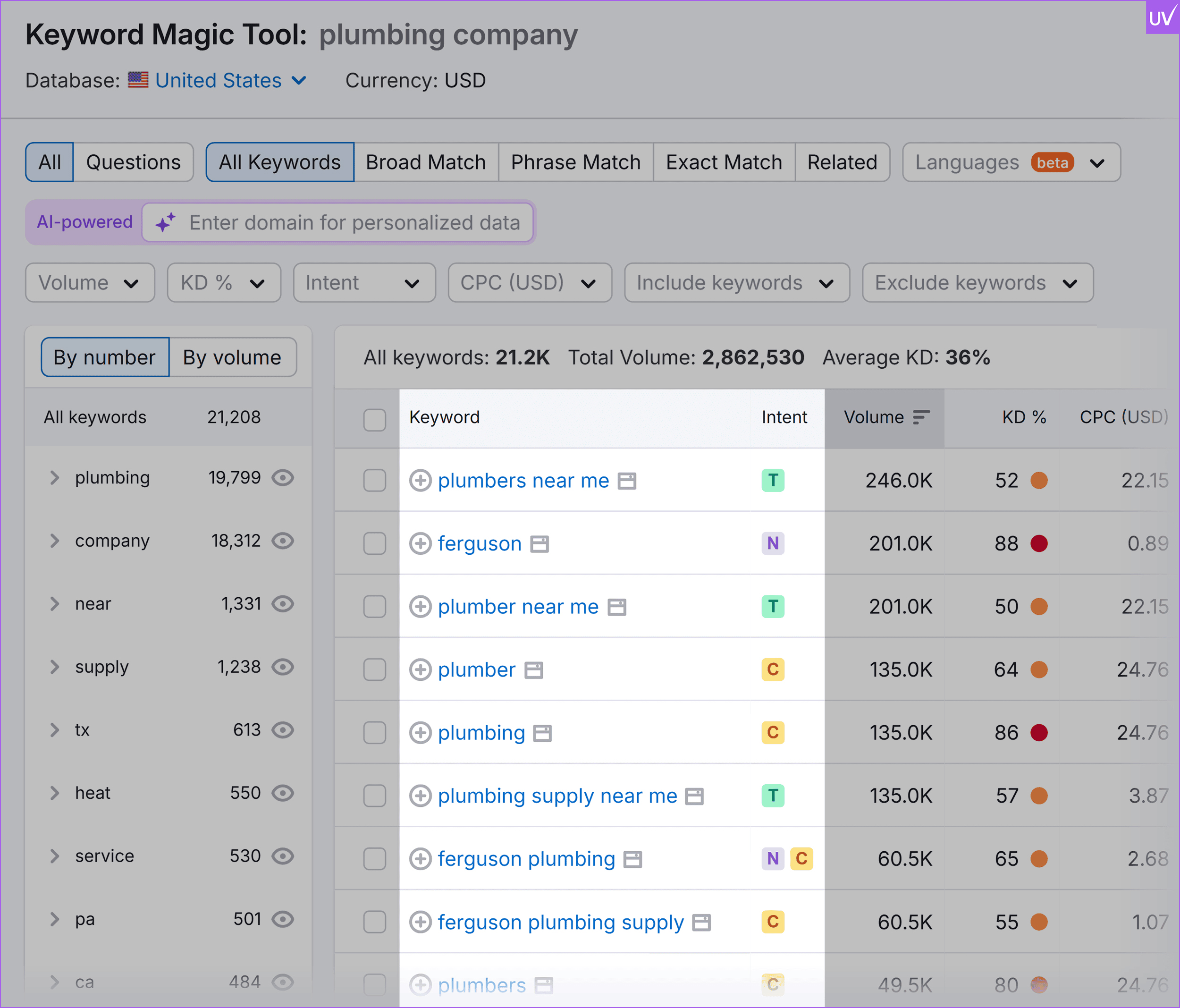
- Use geo-targeting: Do not waste money on irrelevant regions.
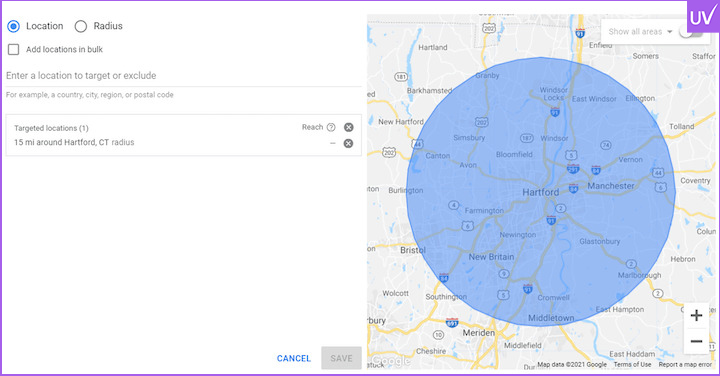
- Refine by Audience: Target specific ages, genders, or other traits to avoid wasting budget on low-converting users.
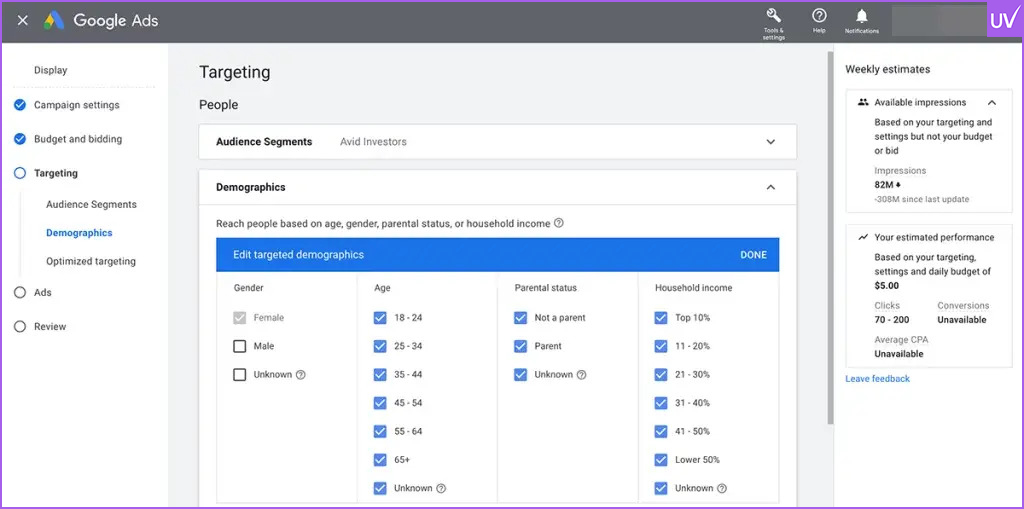
- Test affordable PPC management options: Several agencies, such as Uvisible, have budget packages for small businesses.
Small business PPC campaign budgets don’t have to imply cheap—they can imply smart.
Budgeting by Channel: Split That Marketing Spend
Budget allocation in marketing should not be based on the rule of one-size-fits-all. You should focus on dividing marketing spend by pipeline dollars and performance across channels. Here’s how to divide marketing spend by pipeline dollar:
| Channel | Pipeline Stage | % Budget Recommendation |
| Google Ads | Awareness & Decision | 35% |
| Facebook/Meta | Awareness | 20% |
| LinkedIn Ads | B2B Mid-Funnel | 15% |
| Amazon Ads | Purchase | 20% |
| Retargeting | Conversion | 10% |
You should analyze the performance and then allocate the budget accordingly. Use insights from competitors’ marketing budget split by channel to refine your strategy.
Watching Your Competitors

You don’t exist in a vacuum. Need to remain competitive? Begin monitoring competitor PPC spend.
Sites like SpyFu or SEMrush enable you to view what keywords they’re targeting and how much they’re spending.
This is not copying—this is making smart decisions. If your competitors are spending big on a set of keywords, there’s a reason why. Utilize that knowledge to prioritize the budget.
Can You Set a Budget Target Pipeline for Active Campaign?
Absolutely. Within CRMs such as ActiveCampaign or HubSpot, you can establish objectives and reverse-calculate how much PPC ad spend you’ll require to fill your pipeline.
For example, your average deal size is $1,000, and you’d like to create $100,000. That’s 100 deals. If your conversion rate from customer to lead is 10%, you have 1,000 leads that you require. Take that and multiply it by your CPL, and you have your PPC budget.
It’s a clever, data-driven method of connecting campaign performance to business objectives—and it works especially well when paired with local PPC account management, ensuring your ad spend is optimized for targeted, location-specific results.
Avoiding Common PPC Budget Mistakes
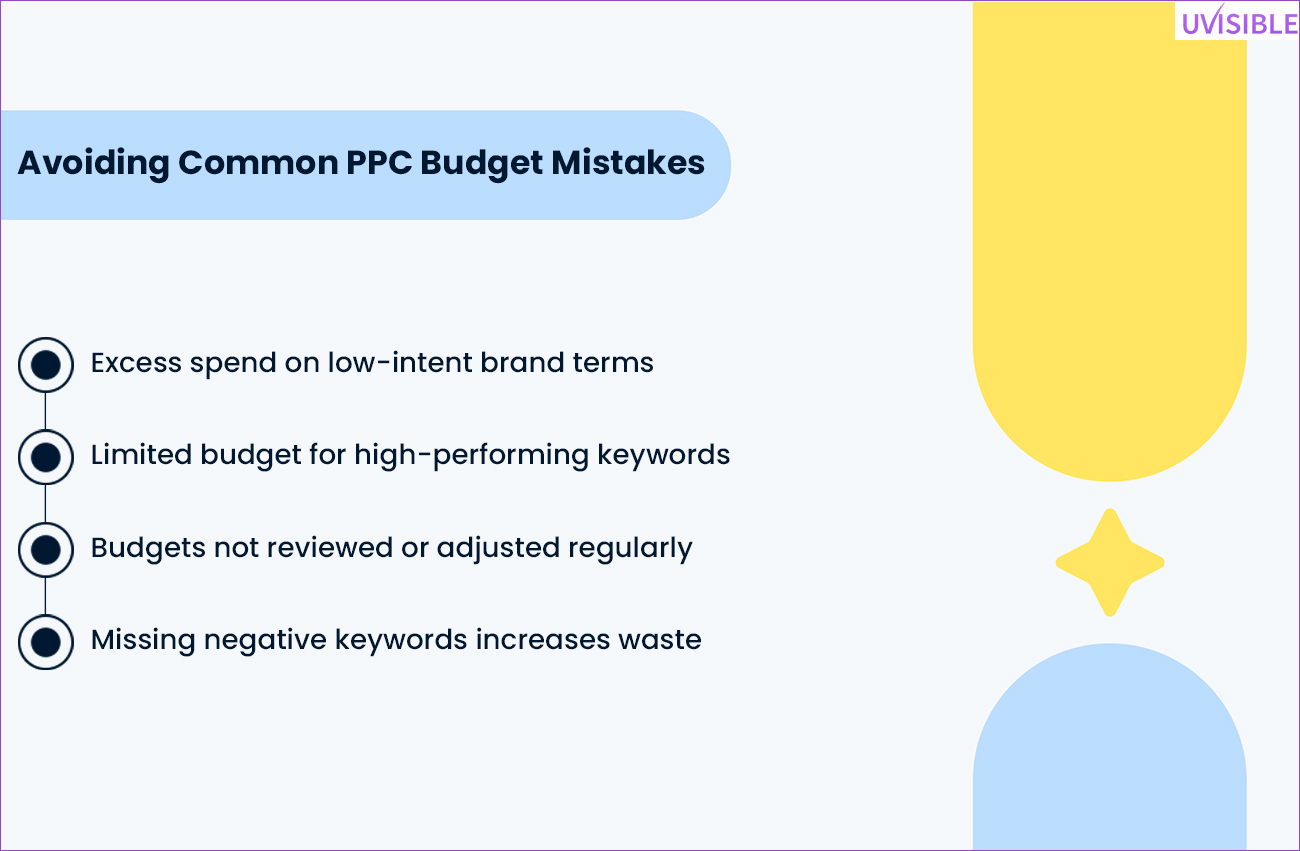
Even experienced marketers get this wrong. Here are some common pitfalls to avoid:
- Over-spending on brand campaigns with low intent.
- Under-spending on high-converting keywords because the initial volume is low.
- Setting and forgetting—budgets must be updated weekly.
- Neglecting negative keywords that blow the budget.
These are just a few examples, but niche-specific issues, like roofing PPC mistakes, can make or break your campaign in competitive local markets.
Successful PPC budget distribution is not a set-and-forget activity. It’s constantly changing, iterative, and informed by performance data.
Tools That Help You Manage PPC Campaigns
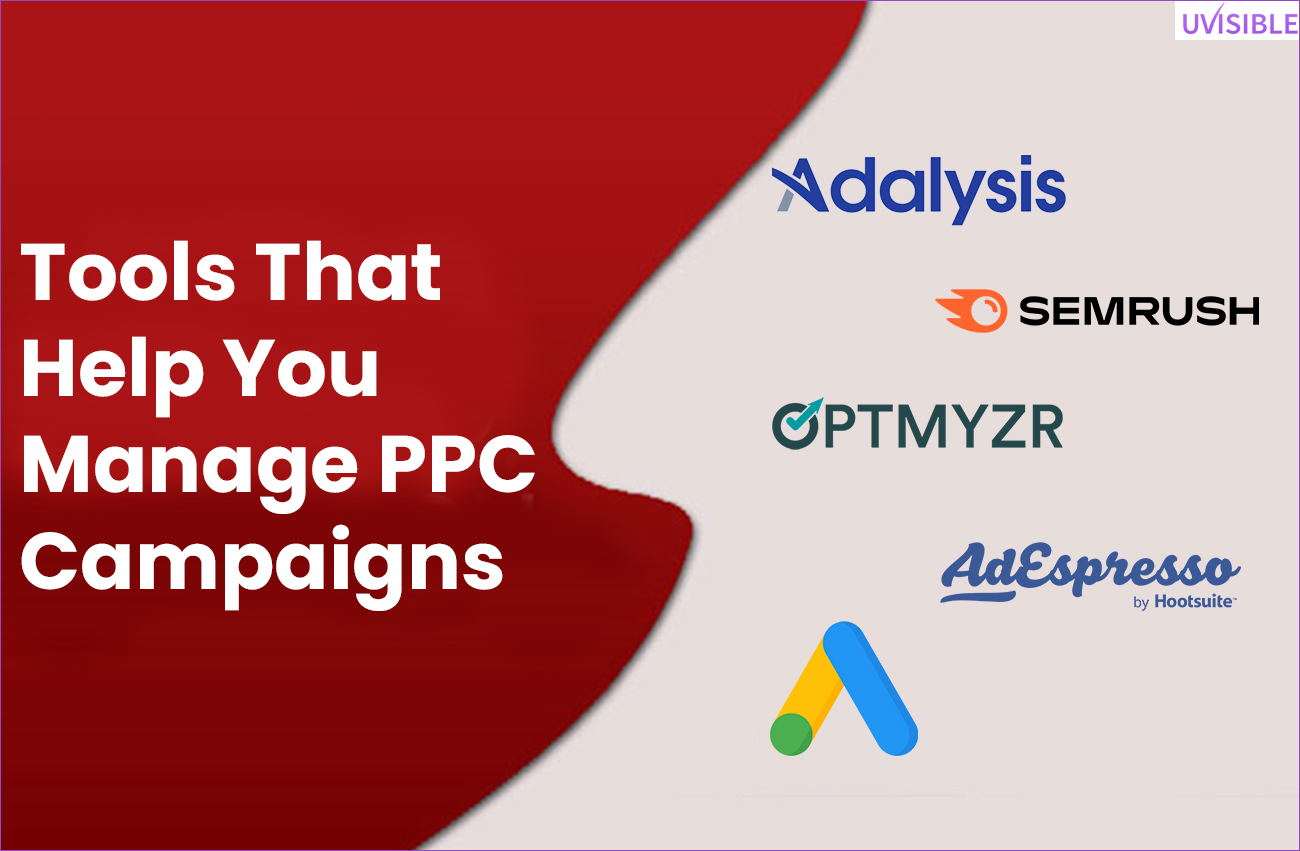
You don’t need to do this by hand. Current PPC budget management tools, such as Google Ads Editor, SEMrush, Optmyzr, AdEspresso, and Adalysis, can assist you with:
- Monitoring real-time performance
- Budget pacing forecasts
- Dynamic fund reallocation
When you automate PPC campaign management with the proper tools, you minimize human error and achieve improved visibility.
Smarter Budgeting, Better Results

Need an agency that makes it all easy and worthwhile?
Uvisible’s PPC Budget planning and allocation services do the heavy lifting for you.
We assist you in:
- Visualizing your overall PPC budget by platform
- Proactively forecast and optimize your campaign budget
- Compare ad budget scenarios
- Obtain competitor PPC spend insights
- Manage PPC ad spend daily and monthly
If you’re ready to get serious about PPC budgeting—without the spreadsheets—Uvisible can be your game-changer.
Final Thoughts
Smart PPC budget allocation is more than just picking some random number, it’s more of creating a profitable strategy.
It’s about using real data to forecast, test, and adjust. It’s knowing which campaigns to stop, which to scale, and where to reduce the budget.
Whether you’re managing a million-dollar campaign or running a small one, the goal is the same: make every dollar count.
Begin small, plan intelligently, and continuously optimize.
And in case you need assistance along the way, don’t forget—companies like Uvisible offer PPC audit services to make your life much simpler and your campaigns more effective.
About us and this blog
We are a digital marketing company with a focus on helping our customers achieve great results across several key areas.
Request a free quote
We offer professional SEO services that help websites increase their organic search score drastically in order to compete for the highest rankings even when it comes to highly competitive keywords.
Subscribe to our newsletter!
More from our blog
See all postsRecent Posts
- How to Market a Roofing Company Online: Digital Marketing, PPC & Social Media for Roofers January 24, 2026
- How to Market Your Cannabis Business Online January 23, 2026
- Why Is Local SEO Crucial for Cannabis & Dispensaries? January 21, 2026




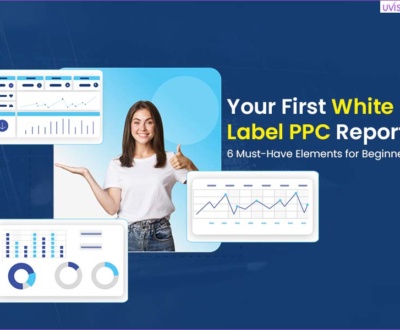
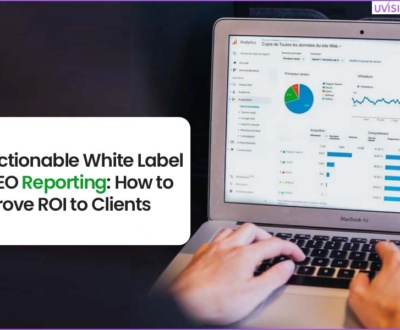
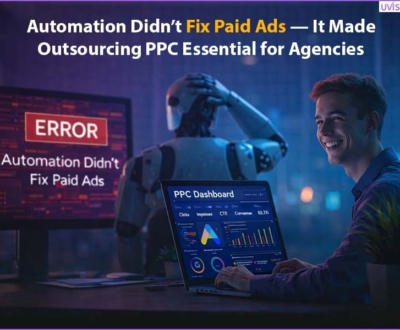


Pingback: Automation Didn’t Fix Paid Ads — It Made Outsourcing PPC Essential for Agencies